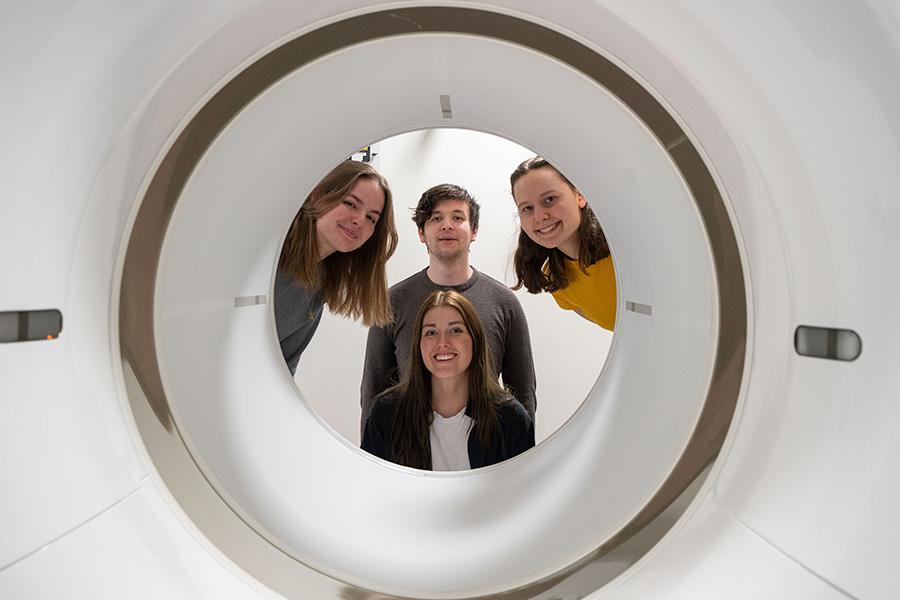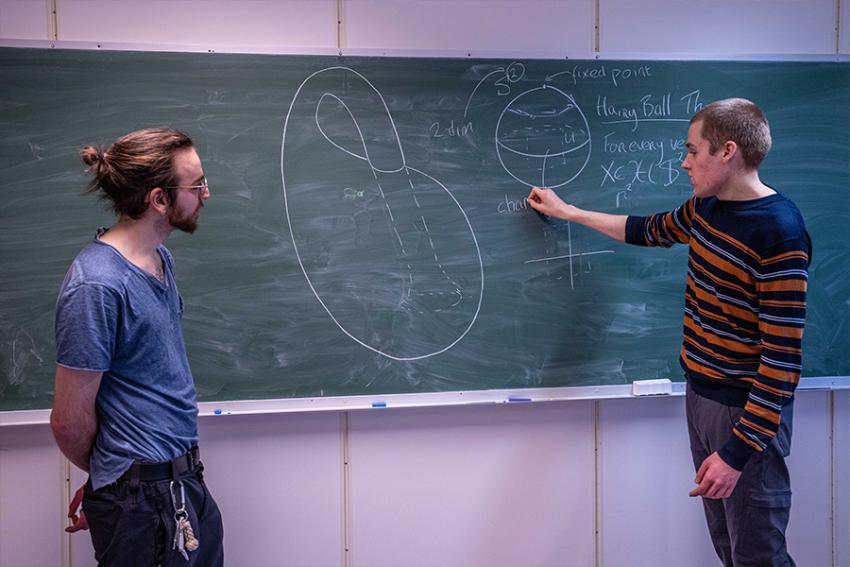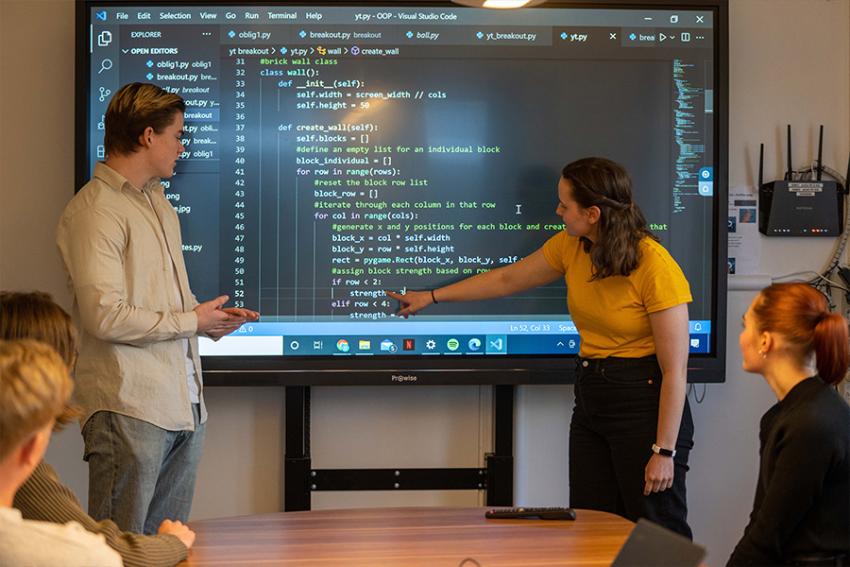This four-year master’s programme offers a practice-oriented and research-based approach to computer science. The programme offers specialization in collaboration with industry, public and private services, health care, and government. Ideal for part-time students with work experience seeking to expand their competency towards knowledge- and research-oriented work challenges.
Teaching is based on an active learning approach consisting of digital resources to support individual and group-oriented learning, as well as two mandatory gatherings (2-4 days) each semester in Bodø.
Bachelor’s degree (180 ECTS) or equivalent qualification, with a major in Computer Science of minimum 80 ECTS.
Applicants must have a minimum grade average comparable to a Norwegian C (2,5) in the ECTS scale, see the UiT webpage for International admissions for more information on how the point average is calculated.
Admission capacity:
30 places
If there are more applicants than available places, applicants will be ranked according to paragraph 15 and 16 in Regulations concerning admission to the University of Tromsø – The Arctic University of Norway.
Applicants from Norway or Nordic countries:
Her finner du all informasjon knyttet til søking og opptak.
The program is not available to applicants from outside the Nordic countries.
- Nordic applicants: 4029
- EU/EEA + Swiss applicants: No admission
- Non-EU/EEA applicants: No admission
Program description
Students will focus on applied problem-solving, practical experience and interdisciplinary learning. The study addresses data-driven applications, with particular emphasis to distributed, AI-intensive, critical systems and software for natural resource observation, public infrastructure and healthcare.
The study programme has both a methodological and practical approach, with emphasis on how to plan and realize small scale research projects in selected application areas.
Mandatory topics include software architectures of large, distributed, data-intensive systems, practices in modern software engineering, and methodology and tools for small-scale informatics research projects in realistic application domains. The domains depend on student interest and university collaborating partners.
The programme also provides elective courses from areas such as medical informatics, or energy informatics, according on the student´s choices.
Upon completing this master programme, you will have a thorough research-based foundation for practicing computer science in industry, research and public services. You will be able to analyse problems and work efficiently towards solutions in an organized manner, independently or in teams. You will be able to collect and analyse relevant metrics characterizing your problem and adapt to the related limitations and necessary changes. You can successfully demonstrate the feasibility of a solution through implementing key parts and will be able to design for system quality and lifetime reliability. You will learn about social and ethical issues that apply to computer science, and how to consider these during your professional career.
The study programme consists of mandatory courses in computer science yielding 50 ECTS credits and 10 ECTS credits of elective courses. The electives may be in computer science or other sciences. The programme concludes with a master thesis of 60 ECTS credits.
Learning outcomes
Knowledge - The candidate has…
- a broad solid foundation in computer science
- a deep understanding of state-of-the-art distributed software architectures
- a considerable depth of understanding of a selected area of specialization
- a solid knowledge of risks and threats in computer systems and their related security measures
- a solid understanding of system and application development relevant to the chosen specialty
- a theoretical insight into software quality, maintainability and reliability
- knowledge and methodological insight to perform basic research design, evaluation, implementation, and dissemination of small computer science research projects in a selected problem area
- knowledge about principles, models and ethics of Generative AI, and of the various limitations of this technology
Skills - The candidate can…
- work independently on a significant non-trivial scientific problem
- formulate viable research questions and hypotheses, perform research surveys and do result analysis and evaluation
- communicate with domain experts and users
- participate in multidisciplinary research and innovation projects
- analyze scientific problems and select and employ effective research methods
- plan, organize, and execute the work required to solve the problem and adapt to changes and limitations
- demonstrate the feasibility of the solution by implementing key parts
- collect and analyze relevant metrics characterizing the problem and the solution
- write a well-structured and clearly formulated report describing the thesis work and reflecting on its results
- write a well-structured and clearly formulated report describing the thesis work and reflecting on its results
- the ability to design and operationalize systems involving Generative AI
General competence - The candidate …
- can contribute to the development of computer science as a dynamic discipline under the influences of advances in theory, changes in technology, and in application areas
- can communicate effectively, orally and in writing, within the field, and with the public as well as experts in other fields
- can pursue life-long learning and development
- is aware of relevant social and ethical issues and apply this awareness to their professional conduct; and
- has competence about how to evaluate, implement and validate systems based on Generative AI
Job prospectives
Here’s a list of popular career paths in computer science:
- Software Developer – Build apps, websites, and systems.
- Data Scientist – Analyze data to find trends and make predictions.
- Cybersecurity Analyst – Protect systems from digital threats.
- Machine Learning Engineer – Create AI models that learn from data.
- Game Developer – Design and code video games.
- DevOps Engineer – Automate and streamline software deployment.
- Product Manager – Lead tech product development and strategy.
Degree Name
Master of Science in Computer ScienceAccess to further studies
Upon successful completion of the degree, and satisfactory grades, students may be qualified for admission to a PhD program in Science.
Related professions
Study plan
Language of instruction
The language of instruction is English and all of the syllabus material is in English. Examination questions will be given in English, but may be answered either in English or a Scandinavian language.
The Master's thesis may be written in either English or a Scandinavian language.
Teaching and assessment
This part-time study programme is a four-year programme covering 30 ECTS each year. It is particularly suitable for students who want to achieve a master’s degree in combination with for instance a regular job.
Teaching is based on an active learning approach using digital resources to support individual and group-oriented learning, as well as mandatory sessions (2-4 days) each semester in UiT's new campus in midtown Bodø.
A successful learning environment depends on the combined efforts of the students. It is important that each student takes an active role, is present in teaching activities and contributes to the learning environment, both in organized teaching and otherwise during the gatherings where the students cooperate and largely learn from each other.
The study programme offers flexibility in the following way:
Courses will consist of a combination of
- Streamed and recorded digital teaching made available for the students to follow flexibly from any location at a suitable time.
- Up to two mandatory physical gatherings in Bodø per semester.
- Co-working in groups – with digital support.
Gatherings in Bodø the Autumn semester 2026:
- Week 38
- Week 46
Gatherings in Bodø the Spring semester 2027:
- Week 6
- Week 14
Most courses are project-oriented, with a mix of independent work and short, more intensive periods centered on physical gatherings. In group work sessions, students are expected to be active in discussions of issues in the subject matter.
Students are expected to work with programming in their own facilities or in laboratory facilities provided by the CS department. This is where compulsory assignments are solved to acquire practical skills in designing, building and maintaining computer systems, either individually or in teams with other students.
Mandatory coursework is usually expected in each course. Mandatory assignments must be approved for access to the final exam in a course.
Examination and assessment may vary between courses, from written examination to project work reports, presentation of scientific work or oral examination. It may also consist of a combination of these methods. Written examinations require physical attendance in Bodø and/or Tromsø.
In addition to collaborating with other informatics students, the students may also work with researchers and professionals from other areas, e.g. areas where technology is to be applied.
Academic staff teaching at the study programme are active researchers. The courses are based on relevant research and are related to the department's research activities. As a student, you will get to know the projects and also be able to engage in projects along the way.
Master theses are often part of a research project. In that case, the research group will provide a working community. The master’s thesis may by agreement also be conducted in, or in cooperation with, a company or other organization outside the university.
During the work on these assignments, individual guidance is provided from the department's academic staff.
There are several possibilities for exchanges abroad. The exchange period depends on your individual study plan and should be planned in collaboration with the student advisor.
UiT is part of the EUGLOH university alliance, with active collaboration on student activities. The alliance is centered on health, but is also relevant for computer science. If you’re interested in studying abroad, the member universities of the alliance could be a good place to start. See the EUGLOHand UiT collaboration websites for more details.
Destinations for studies abroad
Terje Fallmyr
Studieleder og studieprogramansvarlig, bachelor og master informatikk i Nordland (Mo og Bodø)
Jan Fuglesteg
StudierådgiverAndré Henriksen
Førsteamanuensis, Nestleder IFIOther studies you may like
Vil du vite hvordan det er å være student ved UiT? Følg @uitstudent på Instagram eller TikTok, hvor studenter deler fra livet på universitetet. Her får du praktiske tips om studier og studentliv, nyttig informasjon om campus og muligheten til å stille spørsmål om alt du lurer på.
For mer informasjon om studietilbud, forskning og muligheter direkte fra UiT, kan du følge @uitnorgesarktiske på Instagram eller TikTok. Her finner du offisielle oppdateringer og innsikt i hva universitetet har å tilby.






